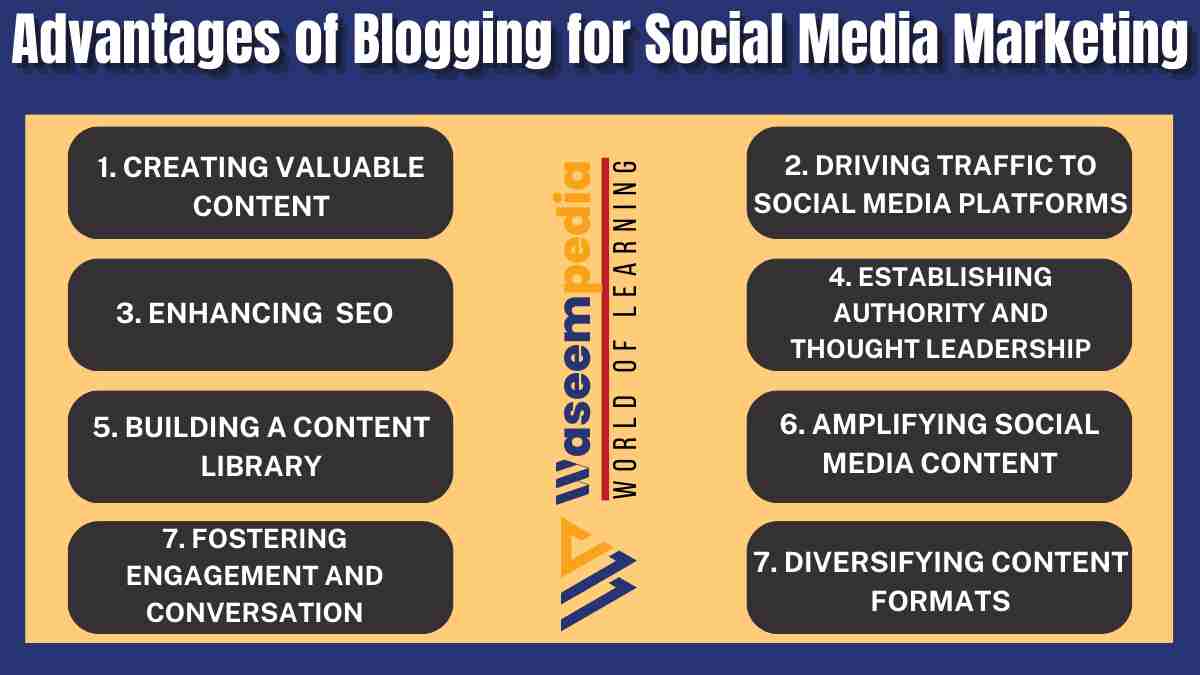Blogging offers numerous advantages for businesses engaged in social media marketing. By creating valuable content, driving traffic to social media platforms, enhancing SEO, establishing authority, building a content library, amplifying social media content, fostering engagement and conversation, capturing email subscribers, and diversifying content formats, businesses can leverage the power of blogging to strengthen their social media presence and achieve their marketing goals.

Blogging and social media marketing are two powerful strategies that, when combined, can significantly enhance a brand’s online presence and marketing efforts. While social media platforms provide immediate engagement and interaction with the audience, blogging offers a platform for in-depth content creation and storytelling. In this article, we will explore the advantages of blogging for social media marketing and how it can contribute to a comprehensive and effective digital marketing strategy.
Power of Blogging and Social Media Marketing
Blogging and social media marketing go hand in hand to create a robust digital marketing strategy. While social media platforms enable businesses to engage with their audience in real-time and build a community, blogging provides an opportunity to create valuable content, drive traffic, enhance SEO, and establish thought leadership. Let’s explore the advantages of blogging for social media marketing in more detail.
9 Advantages of Blogging for Social Media Marketing
9 Advantages of Blogging for Social Media Marketing are as following
1. Creating Valuable Content
One of the primary advantages of blogging for social media marketing is the ability to create valuable and engaging content. Blogging allows businesses to delve into topics more extensively, providing in-depth insights, tips, and educational content. By offering valuable information through blog posts, businesses can position themselves as experts and thought leaders in their industry, which can be shared and promoted through social media channels.
2. Driving Traffic to Social Media Platforms
Blogging acts as a traffic driver to social media platforms. By including social sharing buttons on blog posts, businesses can encourage readers to share the content on their social media profiles, thereby driving traffic back to their social media pages. This not only increases the visibility of the brand on social media but also boosts engagement and follower growth.
3. Enhancing Search Engine Optimization (SEO)
Blogging plays a crucial role in enhancing search engine optimization (SEO) efforts. By regularly publishing high-quality blog posts that target relevant keywords, businesses can improve their website’s search engine rankings. When combined with social media promotion, blog posts can attract organic traffic from search engines, further increasing brand visibility and reach.
4. Establishing Authority and Thought Leadership
Blogging allows businesses to establish authority and thought leadership within their industry. By consistently sharing valuable and insightful content, businesses can demonstrate their expertise and establish themselves as trusted sources of information. When shared on social media platforms, these blog posts can attract attention, spark discussions, and position the brand as a go-to resource in its niche.
5. Building a Content Library
Blogging helps businesses build a content library that can be shared and repurposed on social media platforms. As blog posts accumulate over time, businesses have a vast array of content to draw from, creating a valuable resource for social media marketing campaigns. This content library ensures a steady stream of relevant and engaging content for social media posts, increasing consistency and brand visibility.
6. Amplifying Social Media Content
Blogging provides a platform to amplify social media content. Instead of relying solely on short-form content on social media platforms, businesses can use blog posts to expand upon topics, provide detailed explanations, or tell stories that support their social media marketing efforts. This amplification of content through blogging adds depth and substance to social media campaigns.
7. Fostering Engagement and Conversation
Blogging encourages engagement and conversation with the audience. By allowing readers to leave comments on blog posts, businesses can foster meaningful discussions and build relationships. These conversations can be continued and expanded upon through social media platforms, creating a sense of community and strengthening the brand’s connection with its audience.
8. Capturing Email Subscribers
Blogging provides an opportunity to capture email subscribers and build an email marketing list. By including opt-in forms and calls-to-action within blog posts, businesses can encourage readers to subscribe to their email newsletters. This enables businesses to nurture leads, drive repeat traffic to their blog and social media channels, and promote their products or services directly to a targeted audience.
9. Diversifying Content Formats
Blogging allows businesses to diversify their content formats. While social media platforms primarily focus on short-form content, blogging enables businesses to incorporate long-form articles, infographics, videos, and other multimedia elements. This diversification of content formats keeps the audience engaged, caters to different preferences, and enhances the overall social media marketing strategy.
Related FAQ’s
What are the benefits of blogging for social media?
The benefits of blogging for social media include providing a steady stream of shareable content, driving traffic to your blog, increasing social media engagement, and enhancing your brand’s online presence and authority.
What is the role of blogging in social media marketing?
The role of blogging in social media marketing is to create valuable, shareable content that can be promoted on social media platforms to attract and engage a target audience, drive website traffic, and build brand awareness and authority.
Why is blogging important in marketing?
Blogging is important in marketing because it allows businesses to provide valuable content, build relationships with their audience, establish authority in their industry, improve SEO, and drive traffic and leads to their websites.
How does blogging impact marketing?
Blogging impacts marketing by providing a platform to share valuable content, engage with an audience, improve SEO, build brand authority, and generate leads and conversions through increased online visibility and credibility.
What is blog in digital and social media marketing?
In digital and social media marketing, a blog is a regularly updated online platform where businesses or individuals can publish relevant content to inform, engage, and connect with their target audience, ultimately driving traffic, building brand authority, and generating leads.

